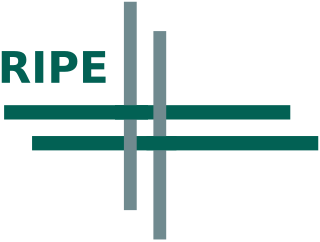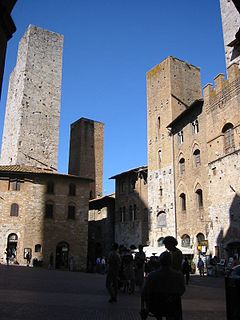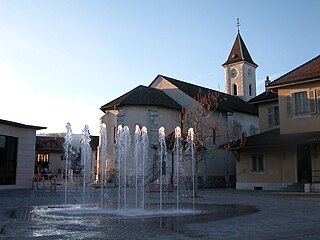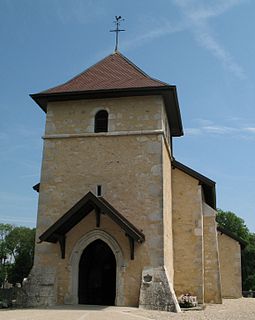
Rural flight is the migratory pattern of peoples from rural areas into urban areas. It is urbanization seen from the rural perspective.

The European Organization for Nuclear Research, known as CERN, is a European research organization that operates the largest particle physics laboratory in the world. Established in 1954, the organization is based in a northwest suburb of Geneva on the Franco–Swiss border and has 23 member states. Israel is the only non-European country granted full membership. CERN is an official United Nations Observer.

A village is a clustered human settlement or community, larger than a hamlet but smaller than a town, with a population typically ranging from a few hundred to a few thousand. Though villages are often located in rural areas, the term urban village is also applied to certain urban neighborhoods. Villages are normally permanent, with fixed dwellings; however, transient villages can occur. Further, the dwellings of a village are fairly close to one another, not scattered broadly over the landscape, as a dispersed settlement.

A peasant is a pre-industrial agricultural laborer or farmer with limited land ownership, especially one living in the Middle Ages under feudalism and paying rent, tax, fees, or services to a landlord. In Europe, three classes of peasants existed: slave, serf, and free tenant. Peasants hold title to land either in fee simple or by any of several forms of land tenure, among them socage, quit-rent, leasehold, and copyhold.

Castile and León is an autonomous community in north-western Spain.

The Common Agricultural Policy (CAP) is the agricultural policy of the European Union. It implements a system of agricultural subsidies and other programmes. It was introduced in 1962 and has undergone several changes since then to reduce the cost and to also consider rural development in its aims. It has been criticised on the grounds of its cost, and its environmental and humanitarian impacts.

Réseaux IP Européens is a forum open to all parties with an interest in the technical development of the Internet. The RIPE community’s objective is to ensure that the administrative and technical coordination necessary to maintain and develop the Internet continues. It is not a standards body like the Internet Engineering Task Force (IETF) and does not deal with domain names like ICANN.

In general, a rural area or countryside is a geographic area that is located outside towns and cities. The Health Resources and Services Administration of the U.S. Department of Health and Human Services defines the word rural as encompassing "...all population, housing, and territory not included within an urban area. Whatever is not urban is considered rural."

Medieval communes in the European Middle Ages had sworn allegiances of mutual defense among the citizens of a town or city. These took many forms and varied widely in organization and makeup.

Meyrin is a municipality of the Canton of Geneva, Switzerland.

Cessy is a commune in the Ain department in eastern France. The area was first inhabited by two farming families in the eleventh century, and as the town has grown its agricultural heritage has remained a significant feature, with the populated area surrounded by a vast expanse of fields and an annual agricultural festival.

The Technical Centre for Agricultural and Rural Cooperation ACP-EU (CTA) was established in 1983 under the Lomé Convention between the African, Caribbean and Pacific Group of States and EU member states. Since 2000 CTA has operated within the framework of the ACP-EU Cotonou Agreement with a mission to “strengthen policy and institutional capacity development and information and communication management capacities of ACP agricultural and rural development organisations. It assists such organisations in formulating and implementing policies and programmes to reduce poverty, promote sustainable food security, preserve the natural resource base and thus contribute to building self-reliance in ACP rural and agricultural development.”
The Deutsche Gesellschaft für Internationale Zusammenarbeit (GIZ) GmbH, often shortened to simply GIZ, is a German development agency headquartered in Bonn and Eschborn that provides services in the field of international development cooperation. GIZ mainly implements technical cooperation projects of the Federal Ministry for Economic Cooperation and Development (BMZ), its main commissioning party, although it also works with the private sector and other national and supranational government organizations on a public benefit basis. According to the OECD, 2019 official development assistance from Germany decreased 1.4% to USD 23.8 billion. In its activities GIZ seeks to follow the paradigm of sustainable development, which aims at economic development through social inclusion and environmental protection. GIZ offers consulting and capacity building services in a wide range of areas, including management consulting, rural development, sustainable infrastructure, security and peace-building, social development, governance and democracy, environment and climate change, and economic development and employment.

The Catholic Church in Europe, is part of worldwide Catholic Church in full communion with the Holy See in Rome, including represented Eastern Catholic missions. Demographically, Catholics are the largest religious group in Europe, while church attendance has declined in the past decades.

National Bank for Agriculture and Rural Development (NABARD) is an apex development finance institution fully owned by Government of India. The bank has been entrusted with "matters concerning policy, planning, and operations in the field of credit for agriculture and other economic activities in rural areas in India". NABARD is active in developing Financial Inclusion policy.
Rural community development encompasses a range of approaches and activities that aim to improve the welfare and livelihoods of people living in rural areas. As a branch of community development, these approaches pay attention to social issues particularly community organizing. This is in contrast to other forms of rural development that focus on public works and technology.
China's banking sector is the largest in the world by assets, with total assets of US40.1 Trillion in the first quarter of 2019 The "big four/five" state-owned commercial banks are the Bank of China, the China Construction Bank, the Industrial and Commercial Bank of China, and the Agricultural Bank of China, all of which are among the largest banks in the world as of 2018. The Bank of Communications is sometimes included. Other notable big and also the largest banks in the world are China Merchants Bank and Ping An Bank.

Saint-Genis-Pouilly is a commune in the Ain department within the Auvergne-Rhône-Alpes region of eastern France.

Peter Jenni, is an experimental particle physicist working at CERN. He is best known as one of the "founding fathers" of the ATLAS experiment at the CERN Large Hadron Collider together with a few other colleagues. He acted as spokesperson of the ATLAS Collaboration until 2009. ATLAS is a world-wide collaboration which started in 1992 involving roughly 3,000 physicists at 183 institutions in 38 countries. Jenni was directly involved in the experimental work leading to the discoveries of the W and Z bosons in the 1980s and the Higgs boson in 2012. He is (co-)author of about 900 publications in scientific journals.
CERN is a particle physics lab in Europe. Cern or variations thereof, may refer to: